T Muso & Co triple horti production at Virginia, SA.
A family horticulture business at Virginia, SA, has weathered the storms of succession and a heartbreaking workplace accident to become an industry powerhouse.
When 38-year-old father of three Chris Musolino describes the conversation he had with doctors after he broke his back in a farm accident 18 months ago, it not only highlights his self-belief but how that same tenacity has lifted the family farming business to new heights.
“Doctors said I would never walk again,” Chris said.
“We disagreed on that.
“It’s a long journey when you are mucking about with the spinal cord but I kept moving. Daily I go walking through the bars. I’m way in front of where they ever thought I’d be and I’ll keep pushing.”
The parallels between Chris’ health journey and the trajectory of their horticulture operation, which has almost tripled production in the same time frame, can’t be denied.
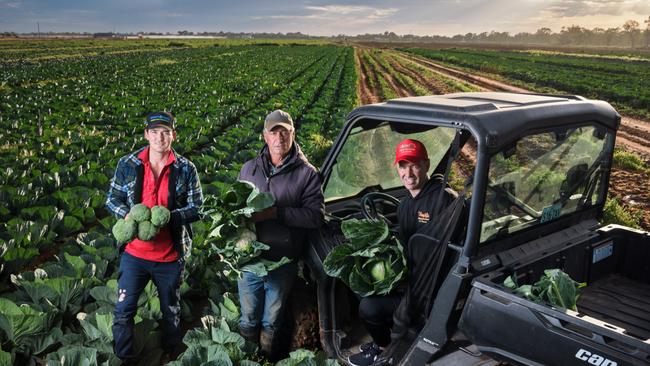
A STEP BACKWARDS
T Muso & Co is a multi-generational family horticulture business at Virginia, in the Port Gawler region of South Australia, that began on a modest two hectare plot in the 1950s when Chris’ grandfather migrated from Italy, and grew to 608ha as Chris’ father and uncles took on and operated the family business.
The real growth though, has come in the last four years following farm succession when Gino Musolino (Chris’ father), Chris and his two brothers John and Matthew, transitioned out into their own family business.
They bought Don Ruggiero’s 210ha property at Langhorne Creek and with it came the opportunity to continue his Staycrisp Premium Lettuce brand, which he had supplied to Woolworths for more than 20 years. Don’s property, 1½ hours away, was secured to allow for geographical climate variations and long-term sustainable growth.
The Musolinos started their own nursery to have more control over the supply of seedlings and reduce risk, and have also partnered with another major retailer to become one of the biggest lettuce and brassica growers in South Australia.
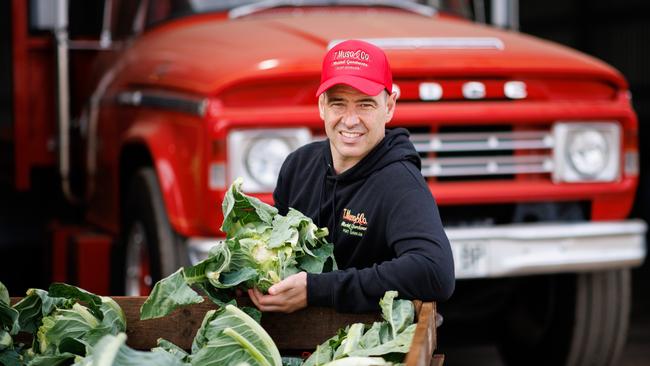
SUCCESS IN TRANSITION
The business growth hasn’t just been a result of more land and customers.
“By building a better team and culture and everyone playing a role and being happy, helping the person next to them, the better morale we had and better output,” Chris said.
Since the accident, Chris, who previously worked in a paddock role, is now hands-on in high-end planning, pricing, supply and marketing, and also human resources.
“I’m no genius, but I listen to them all and try to help as much as possible with open communication,” he said.
“It is a completely different atmosphere now and everyone is going in the same direction. The same amount of people are doing double the output and stepping up into roles they didn’t think they could.”
Gino and John share growing duties, Matthew looks after production and Chris is overseer.
“We have five crews – broccoli, cauliflower, lettuce, cabbage, and packing – and those managers are really good,” Chris said.
“Everyone always says their staff are like family but we feel like these guys are our close friends because we choose them and they choose us, and that’s what makes the relationship so special.
Finding the silver lining in his accident, Chris said the farm got bigger and busier without him there because other employees like Ryan Star and Brayden Dichiera, stepped up.
“They really went to another level and while it’s Gino, myself, John and Matthew that get the accolades, what these other guys do on a day-to-day basis sits higher than anything to us,” Chris said.
“It has also made my job more important because I’ve been able to concentrate on growing the business and making those high-end contacts with Woolies and Coles.”
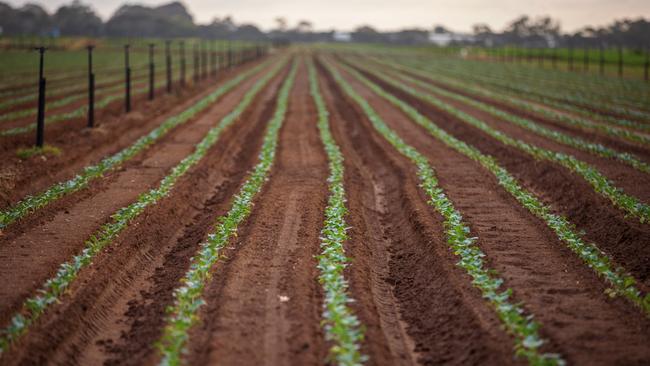
STEPPING STONES
Up until four years ago, the Musolinos only supplied Woolworths and Adelaide markets but Chris struck a deal with Coles and now the two major supermarkets take 95 per cent of their orders, which are sold to South Australia, Western Australia and the Northern Territory.
“Since grabbing the opportunities with both supermarkets, we haven’t looked back,” Chris said.
“It’s a really big stepping stone that has taken out a lot of our risk as we aren’t competing against everyone in the market. It has increased everything for us and given us the confidence to do it.”
The new property at Langhorne Creek has allowed them to plant weekly, year-round.
“We couldn’t farm lettuce through the summer before but now we aren’t stopping at all,” Chris said.
The nursery, introduced in the past 12 months, allows the Musolinos to have full control from seedlings to supermarket.
“There is no-one in-between except fertiliser, chemicals and labour,” Chris said.
“We control what we can control and do the best with what we can’t, it’s all you can do.”
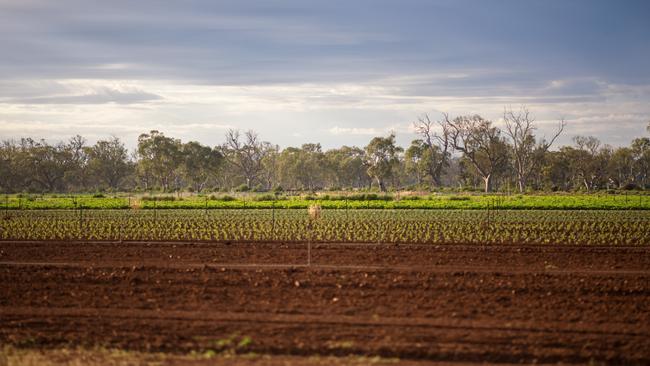
REAP WHAT’S SOWN
The Musolinos plant 5.2 million broccoli seedlings on 142ha each year, producing 100,000 broccoli each week; 2.8 million cauliflower seedlings on 151ha each year, producing 50,000 cauliflowers per week, and 7.7 million lettuce seedlings on 142ha, growing 150,000 lettuces a week.
They also plant over 800,000 cabbage seedlings a year.
They produce cauliflower rice, which allows them to value-add and use 100 per cent of their cauliflower crop.
Harvesting of vegetables is six to seven days a week and most of the produce is field packed or packed on-site. Packing sheds contain hi-tech cooling equipment.
Chris said their key focus was always on quality.
“Broccoli is field packed into crates and hydro cooled or vac cooled – the main thing is getting the temperature out of the product,” Chris said.
“Once you harvest the vegetable, it is dying until you have a chance to stop it via cooling. Every hour it’s out of cooling, it’s losing shelf life. Our aim is to have it cooled within an hour and everything harvested is into shops the day after.
“We want that top quality shelf life for customers and that increases all our orders – our rejection rate is so minimal.”
A BURNING ISSUE
Chris said they spent more money on fertiliser during dry years because salt levels in the soil were higher. It was a challenge to get the balance right.
“Lettuce hates salt and you get tip burning with high salt levels.”
At Langhorne Creek with water from the Murray, salt levels are only a quarter of those at Port Gawler, allowing the strategic production of high quality lettuce throughout the summer months.
Soil health is crucial and crop rotation and cover crops are essential to maintain quality.
Agronomists conduct regular leaf tests and soil tests for pH and nutrient levels and fertiliser is applied where required.
Integrated Pest Management is used as much as possible to reduce chemical sprays.
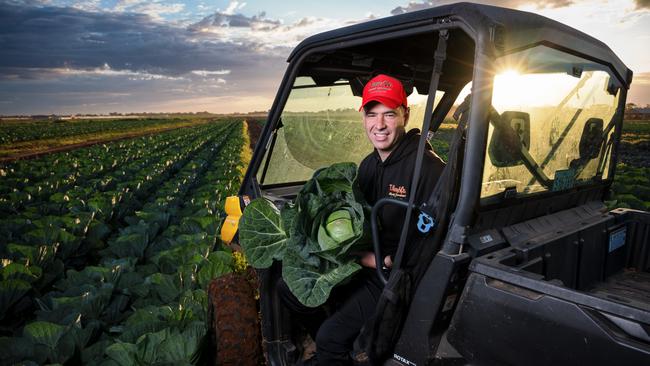
INVEST IN QUALITY
Having size and scale has also meant the Musolinos can spend more on managing quality.
“For us, we spend a bit more than the next guy on the way we do things for quality reasons,” Chris said.
“We spend more on fertiliser – you can grow a cauliflower, broccoli or lettuce rough and quick for a short shelf life but if you want it for shelf life, you need to put better quality fertiliser on that isn’t so harsh.
“We will cut a bigger percentage of the crop, which allows us to get better prices for a better product.”
The Musolinos are also working on improving environmental sustainability practices where possible by installing solar pumps and using biodegradable carton material.
“All our supermarket produce is in crates now, we don’t have any wax cartons floating around,” Chris said.
“Minimising our carbon footprint is always a key concern.”
EFFORT VERSUS REWARD
Chris is confident the business will continue to grow stronger each year.
“If Coles and Woolies continue to take big volumes and commit long term, we would be happy to buy more land and if all goes well in the next four to five years, we could double or triple the size of our business again,” he said.
“We all have young families and everyone is very much on the same path so I hope to see the growth continue with the same team in place.
“I hope to be walking around the paddocks again myself in the next five years too.”




